We Tested 7 Water Filter Pitchers—Two Stood Out
Dotdash Meredith and Yahoo Inc. may earn commission or revenue on some items through the links below.
Our top picks are from Brita and PUR.
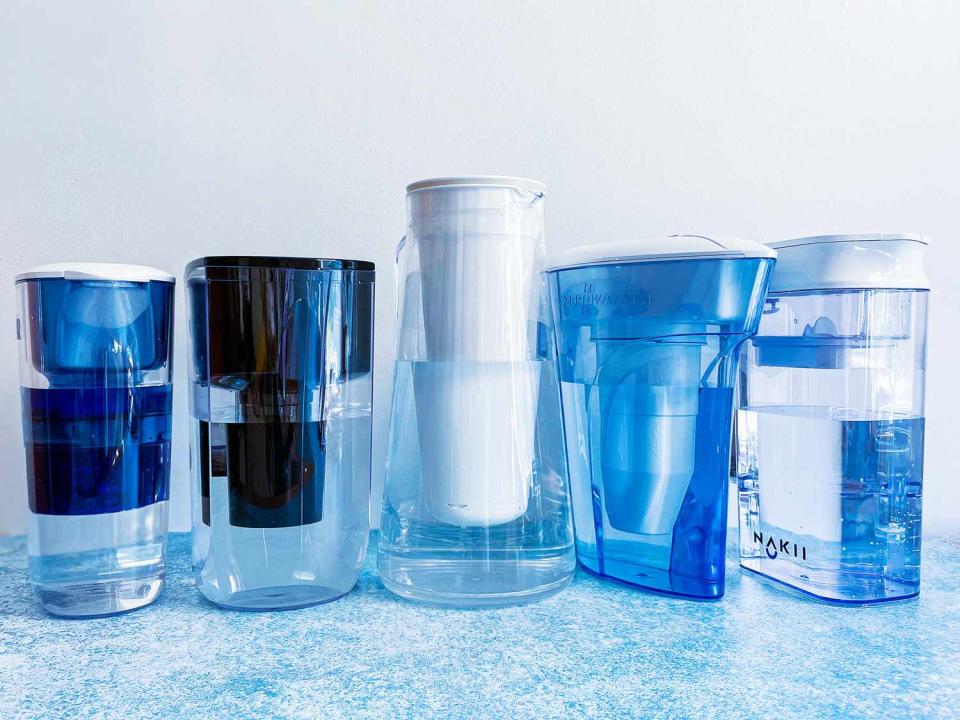
Serious Eats / Abigail Clarkin
Our favorite water pitcher was the Brita Longlast Everyday Water Filter Pitcher. It filtered easily, poured smoothly, and was fairly easy to clean. For a more budget-friendly water pitcher, we liked the PUR Water Pitcher Filtration System, 7-Cup. While it was a tad smaller than the Brita, it filtered incredibly fast and poured nicely.
It’s hard to go any amount of time without needing water for something, whether you’re hydrating after a workout or freezing ice cubes for cocktails. But not all water is as clean as it could be and there are chemicals (like mercury and lead) and other contaminants that can make their way into your tap. And while we won't go into things like whether chlorination is good or bad or safe or not, if you're worried about the quality of your water or don't like the smell or taste of your water, a water filter pitcher may be right for you.
To find the top water filter pitchers, we tested seven popular models. They ranged from seven to 10 cups in capacity and were made from plastic, bamboo, and/or polystyrene. We explored how these filters worked, identified their certifications, taste-tested filtered water, and reviewed each pitcher’s ergonomics. Before we dive into the details, here’s a look at a few of our favorites.
The Winners, at a Glance
The Best Overall Water Filter Pitcher: Brita Longlast Everyday Water Filter Pitcher

This Brita pitcher housed an impressive 10 cups of water and had both an excellent handle and spout. It was easy to use, from assembly to cleaning, and we felt confident that our water was being filtered well due to multiple certifications from the Water Quality Association (WQA).
The Best Budget Water Filter Pitcher: PUR Classic Water Filter Pitcher

This PUR pitcher filtered rapidly. The size and shape of the pitcher was great for anyone with limited counter or refrigerator shelf space, and the handle and spout made both transporting and pouring effortless.
The Tests
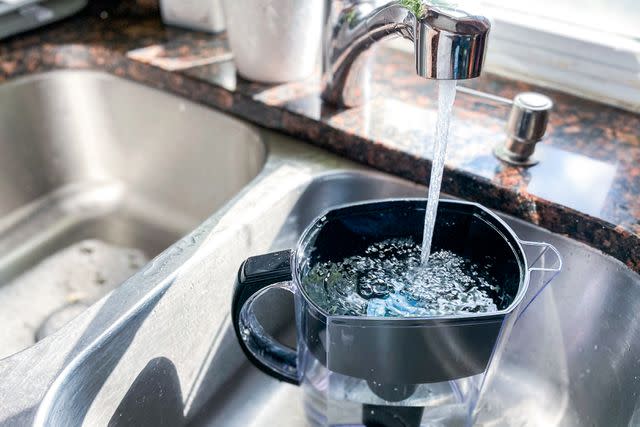
Serious Eats / Abigail Clarkin
Flow Rate Test: After assembling each pitcher, we examined and recorded the flow rate. We used a stopwatch to record how long it took for each pitcher to fill and then to empty.
Filtration Taste Test: We conducted a blind taste test to see if there was a noticeable difference between our unfiltered tap water, bottled water, and water filtered by the pitcher.
Usability and Cleaning Test: We poured from and cleaned each pitcher in order to determine how easy they were to use on a daily basis.
What We Learned
The Best Filters Were Fast
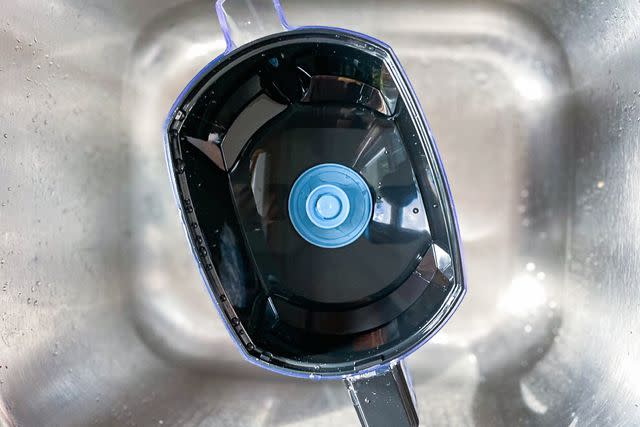
Serious Eats / Abigail Clarkin
We preferred pitchers with filters that took minutes to work rather than hours.No one likes standing around waiting for water to filter. As we reviewed pitchers, we discovered that each one varied in filter time. We were shocked to find that the PUR Ultimate Filtration Water Filter Pitcher took one hour and 15 minutes to complete filtration. But others were refreshingly fast: The Soma Pitcher filtered in two minutes and 53 seconds, followed by the Nakii Water Filter Pitcher, which filtered in four minutes and 20 seconds.
Certain Pitchers Filtered Out More Pollutants Than Others
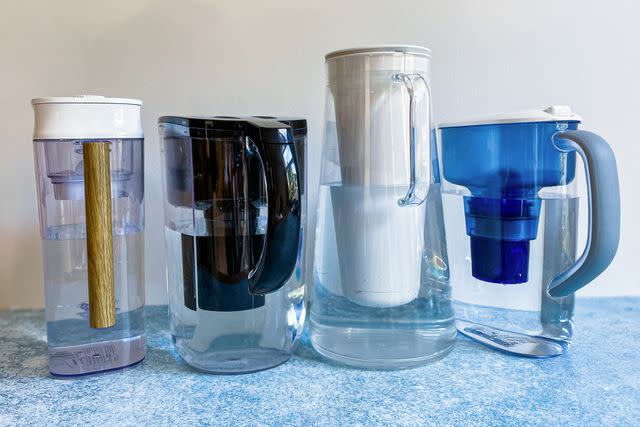
Serious Eats / Abigail Clarkin
Some water purifying certifications hold more sway than others.According to the WQA, drinking water often has traces of pollutants in it. To avoid ingesting such pollutants, the WQA recommends the use of “devices that have been rigorously tested and certified to independent standards.” Both the WQA and the National Sanitation Foundation (NSF) conduct rigorous testing in order to certify qualifying water filters. So what certifications should you look for?
According to the NSF and the American National Standards Institute (ANSI), the following are key certifications:
The NSF/ANSI 42 certification covers pollutants that may affect the appearance, taste, and odor of water. This ensures the reduction of chemicals such as iron, chlorine, zinc, and chloramine.
When it comes to contaminants that may lead to health risks, the NSF/ANSI 53 certification ensures that the filter allows only the minimum amounts of lead, chromium, and cryptosporidium, to name a few.
The NSF/ANSI 401 certification considers contaminants that “have been detected in drinking water supplies at trace levels.” These include herbicides, prescription drugs, pesticides, and more.
Proportionate Handles Were Best for Easy Pouring
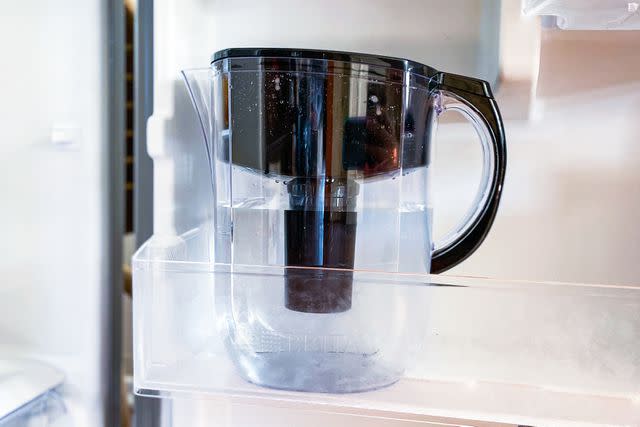
Serious Eats / Abigail Clarkin
The handle on the Brita filter was nicely thick and balanced, making it easy to grip and pour with.When it came to pouring, the water pitchers with proportional handles performed best. Using a pitcher can require lifting it out of the refrigerator, placing it in the sink for a refill, or even toting it across the room to serve someone. During testing, it quickly became apparent which pitchers had handles worthy of such tasks. Our winner, the Brita Longlast Everyday Water Filter Pitcher, had a rounded, moderately thick handle that nicely balanced the weight of the rest of the pitcher. Less ergonomic pitchers included the LifeStraw Home 10-Cup, which was tall and had a pleasing curve to the pitcher. However, its thin handle was hard to grip, most likely due to its small size and slick, plastic surface.
Read More:We Tested 9 Soda Makers—Here Are the Ones that Make the Best Bubbles
Some Spouts Were Superior to Others
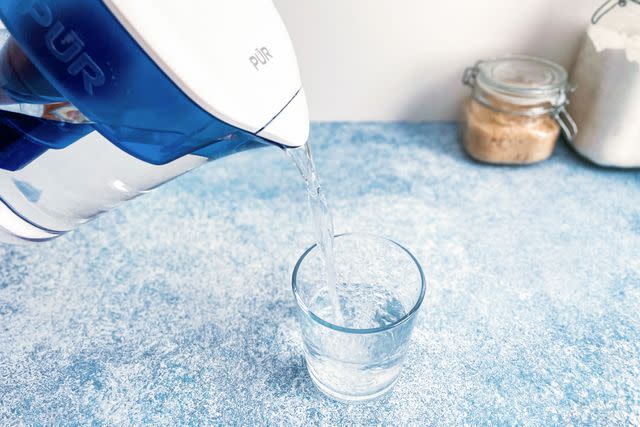
Serious Eats / Abigail Clarkin
We preferred pitchers that poured smoothly and at a steady pace.Although a number of the pitchers were lovely to look at, it turned out that looks weren’t everything. Both the Soma Pitcher and the Nakii Water Filter Pitcher looked gorgeous and filtered quickly, but each performed poorly when pouring, and both had needless spout covers. In the case of The Soma Filter, tipping the filter too far forward led to water spilling from both the spout itself and the seam between the spout and the spout cover. But if we tipped too little, the water simply dribbled sadly down the front of the pitcher.
The Criteria: What to Look For in a Good Water Filter Pitcher
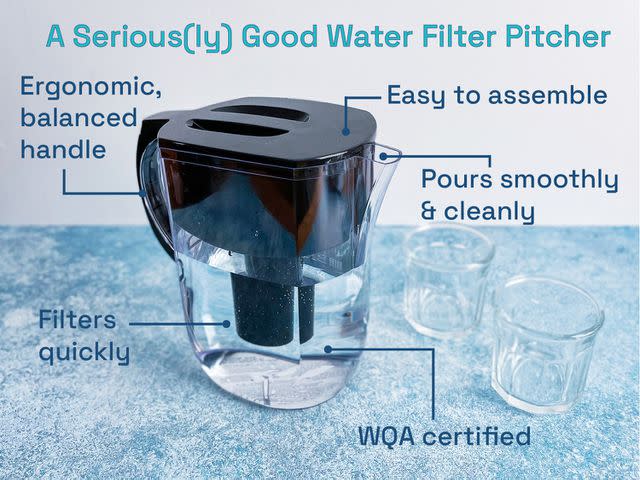
Serious Eats / Abigail Clarkin / Grace Kelly
The ideal water pitcher filled in a reasonable amount of time and did not require too many refills of the filtering reservoir. Our favorites were easy to assemble, pour from, and clean, and they filtered fairly quickly. They were also ideally WQA-certified against certain pollutants and had affordable replacement filters.
The Best Overall Water Filter Pitcher: Brita Longlast Everyday Water Filter Pitcher

What we liked: This sturdy, simple water pitcher checked nearly all the boxes for us. While taste testing, we found that it removed all traces of the less-desirable flavors found in our unfiltered tap water. Although this pitcher fell solidly in the middle of the pack when it came to filling and filtering (it took 14 minutes), we found that the wide, slow-curving spout was excellent to pour from. The handle was proportionate to the size of the entire pitcher, making it comfortable to grip. It was also easy to remove the filter and give the whole pitcher a wash. We especially liked the filter itself: it’s made from a combination of activated carbon surrounded by absorbents, a pleated filter, and fibrous matrix—in short, it’s heavy-duty. Brita recommends replacing the filter after six months of use, and a replacement filter costs around $20.
What we didn’t like: While we didn’t uncover any major issues with this pitcher, we weren’t huge fans of the appearance; it’s relatively bulky and by no means pretty (especially when tested alongside The Soma Pitcher). Dare we say the simple, grooved black plastic on the cover reminded us of a knock-off Darth Vadar costume?
Price at time of publish: $45.
Key Specs
Capacity: 10 cups
Weight: 2.29 lbs
Product dimensions: 11.94 x 7.38 x 16.75 inches
Materials: Polystyrene
Care instructions: Hand wash pitcher with soap and water after removing filter
Certifications: Certified by WQA against NSF/ANSI 42, 53, 401
Compatible filters: Amazon basics filters, Brita Elite Water Filter Replacements
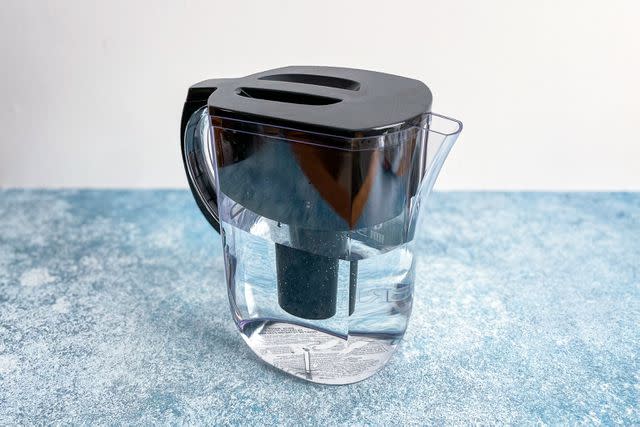
Serious Eats / Abigail Clarkin
The Best Budget Water Filter Pitcher: PUR Classic Water Filter Pitcher

What we liked: This pitcher impressed us immediately. The filter takes a mere four minutes and 35 seconds to filter and fill. As we conducted our taste test, we discovered there were no discernible remains of the flavors often found in our unfiltered tap water. The pitcher was compact enough that it fit snugly in refrigerator doors and on crowded countertops. When using it, we found that its handle was optimal for gripping, and it poured beautifully with no spillage. Disassembling the pitcher to clean was also an easy and straightforward process.
What we didn’t like: Our one challenge when using this pitcher involved the initial install of the filter itself. It was important to line up the handle on top of the filter with the seam running the length of the pitcher. If the filter was not properly lined up and tightened, then it came loose during heavy pours (as we found out the hard way). It was also a tad smaller than the Brita.
Price at time of publish: $17.
Key Specs
Capacity: 7 cups
Weight: 3.5 lbs
Product dimensions: 9.6 x 4.5 x 10.1 inches
Materials: Plastic
Care instructions: Dishwasher-safe after removing filter
Certifications: Certified by WQA against NSF/ANSI Standards 42, 53 and 401; certified by NSF International against NSF/ANSI Standards 42, 53, and 401
Compatible filters: PUR PLUS Water Pitcher Replacement Filter
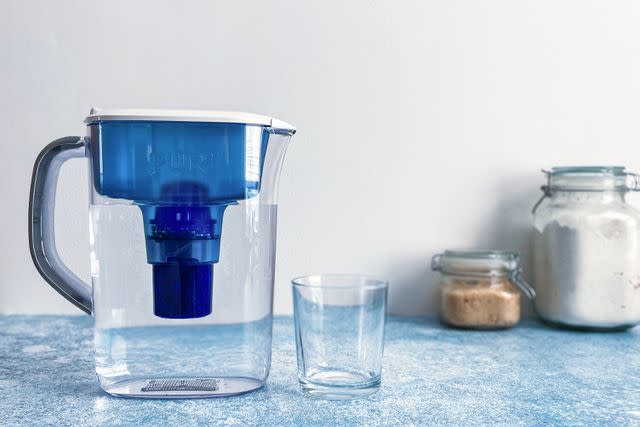
Serious Eats / Abigail Clarkin
The Competition
ZeroWater 10 Cup Ready-Pour: This pitcher was a contender for one of our top picks, but, in the end, the weight and awkward shape proved too cumbersome for daily use.
LifeStraw Home 10-Cup Pitcher: This pitcher was elegant, statuesque, and by far the largest we tested; in fact, it was too heavy and large to fit on the shelves in our refrigerator. And, alas, it took more than 45 minutes for the pitcher to filter enough water to fill the reservoir.
The Soma Pitcher: While we were pleased to find this filter boasted the fastest filtration time during our testing (a speedy two minutes and 53 seconds), we found some issues: the wide spout led to major drippage while pouring, and the top sealed so snugly to the filtration reservoir, that we struggled to disconnect the two for cleaning.
Nakii Water Filter Pitcher: This pitcher filtered quickly and was visually attractive, with an elegant combination of plastic and bamboo. However, there was a fair bit of spillage when pouring. When it came to cleaning the pitcher, we had difficulty cleaning the multiple indentations on the top.
PUR Ultimate Filtration Water Filter Pitcher: From the proper certifications, to the functionality of the spout, to the dimensions, this filter ticked off many of the boxes for a great water pitcher. Unfortunately, the pitcher took well over an hour to filter and fill the water reservoir; it was just too slow.
FAQs
Are water filter pitchers worth it?
If you're worried about the quality of your water or don't like the smell or taste of your water, investing in a water filter pitcher may be right for you. Refilling a reusable water pitcher can also help reduce the amount of plastic bottles purchased and ultimately recycled or thrown away. Plus, if you’re a cocktail guru, you might use a water pitcher to make the freshest, best-tasting cocktails and/or ice.
Do water filter pitchers remove bacteria?
Water pitchers certified by the WQA have a number of certifications that ensure numerous common pollutants are removed. Bacteria, however, is a tad trickier to get rid of. According to the Centers for Disease Control and Prevention, activated carbon filters do not remove bacteria. On the other hand, a distillation unit does remove bacteria, but they can be quite expensive.
How can I find out what is in my tap water?
If your water supplier does not already provide you with a yearly Consumer Confidence Report, you can find out through the United States Environmental Protection Agency website. If you’re curious about whether or not you have hard water, there are various self-administered tests, such as this Premium Water Hardness Test Kit.
How often should I replace my pitcher's water filter?
Brita recommends replacing their filters after 40 gallons, or about two months, while PUR says their filters last around three months (or 100 gallons). When in doubt, however, check your manufacturer for filter replacement instructions; this information is usually included in the manual.
Read More:We Tested 7 Stainless Steel Water Bottles to Find the Best Ones for Everyday Use

